| Sep-20-07 | | RookFile: Considering that Tarrasch at one point was up two pawns, you'd have to say that Marshall 'swindled' him in this game.... |
|
| Sep-20-07 | | paladin at large: Certainly bad judgment by Tarrasch with 29....Qxh3 to take the second pawn, what with white's bishops and big guns available to train on an exposed black king. Tarrasch was already weak on the white squares so that Kg2 fit in perfectly for Marshall. Beautiful play by Marshall the rest of the way. |
|
Sep-20-07
 | | Pawn and Two: <An even game was arrived at in the middlegame. Later on Marshall was outplayed altogether, the Doctor having a won game at the adjournment. When play was resumed, Marshall was in a desperate position, and also pressed for time, whilst his opponent had an hour in hand. The unexpected then happened.> - Leopold Hoffer - The Field |
|
Sep-25-07
 | | Pawn and Two: <paladin at large: Certainly bad judgement by Tarrasch with 29...Qxh3 to take the second pawn> A carefully played game by both players until move 28 when errors by both players caused a lot of excitement. 28.Bd3? was an error, allowing 28...Bxg3 29.Qxh7+ Kxh7 30.Bxf5 Bxf2+ 31.Kxf5 gxf5 with advantage for Black. Instead, Marshall should have played 28.g4, after which Fritz shows White has a slight advantage. Tarrasch then gave the advantage back with 28...g5?. Now White can gain the advantage with; (.71) (17 ply) 29.Bxf5 gxh4 30.Bb6 Rg8 31.g4 h5 32.Kg2 Be5 33.Re4 Rg7. Instead, Marshall then erred with 29.Qc4?, allowing (-.17) (18 ply) 29...Qxh3 30.Bxg5 Rf8 31.Qe6 Qxe6 32.Rxe6 fxg5 33.Rxd6 Rfd8 34.Rxd8 Rxd8 35.Be4 Rd7. Fritz confirms that 29...Qxh3 was Black's best move.
Marshall then slipped with 30.Qe4?, which allows 30...Ne5 (-.59) (15 ply) 31.Bf1 Qh5 32.Be2 g4 33.Rxb7. Tarrasch missed 30...Ne5, and after 30...Re8 31.Qf3 Qh6, the game was back to nearly equal. The best line was now; (-.23) (16 ply) 32.Be4 Ne5 33.Qd1 Nc4 34.Ba7 Rbd8 35.Bxb7 Be5. However, Marshall then erred with; (-.84) (16 ply) 32.Kg2? Ne5 33.Qd5 Nxd3 34.Qxd3 Be5 35.Rh1 Qg7. Over the next few moves Marshall did not find the best defense. At move 43, he could exchange into a losing endgame with; (-1.20) (17 ply) 43.Bd4 Qc6+ 44.Kg1 Bxd4 45.Rxd4 Re8 46.Rxe8+ Qxe8 47.Rd6 Kg7. Not surprisingly he tried something else; (-1.68) (16 ply) 43.Be3 Qc6+ 44.Kg1 Re8. Now however, White is totally lost. So with nothing to lose, Marshall played the unexpected, 45.Bxg5?!. After 45...fxg5 46.Qxg5+, Tarrasch played one of the worst moves of his career with 46...Bg7???. A totally won position transformed into a totally lost position in one move! |
|
| Jan-02-14 | | bkpov: White missed a beautiful counter move 33. Rh1 |
|
Jan-02-14
 | | beatgiant: <bkpov>
<33. Rh1>
Can you give some analysis? At first glance, 33. Rh1 Qxh1+ 34. Rxh1 Nxf3 35. Rxh7+ Kg8 36. Kxf3 Re7, and I don't see what White gets for the sacrificed material. |
|
| Jan-27-19 | | zydeco: After 46....Rg7 white could resign. |
|
Apr-03-21
 | | KEG: Tarrasch's four-year layoff since his victory at Vienna 1898 continued to plague him at the beginning of Monte Carlo 1902. He had lost a tough struggle to Tchigorin in Round 1, and now in Round 2 blundered away a won position against Marshall on his 46th turn (transforming, to quite <Pawn and Two> "a totally won position...into a totally lost position in one move!" But even before his move 46 blunder, Tarrasch had made some uncharacteristic errors that relinquished earlier advantages he had enjoyed. As for Marshall, after being two pawns down in a seemingly hopeless position, his play to confuse Tarrasch was reasonably called a "swindle" by <RookFile> Tarrasch nonetheless managed to finish ahead of Marshall in the final standings (tying for 5th-7th prizes while Marshall ended up 9th). In 1903, Tarrasch returned to form in winning Monte Carlo 1903, and then demolished Marshall in their 1905 match. Despite Marshall's spectacular victory at Cambridge Springs 1904, from 1895 to at least 1907 Tarrasch must be deemed to have been the second-best player in the world behind Lasker (and the best when Lasker was idle). Marshall's tactical brilliance notwithstanding, Tarrasch at his best was the far superior player. And had the Lasker-Tarrasch match been played before 1908 (by which time Tarrasch was past his prime), that contest might have been closer than the actual 8-3 Lasker victory in their match might suggest. 1. d4 d5
2. c4 e5?!
The Albin Counter Gambit. A reasonable try by Tarrasch to force Marshall out of his comfort zone (i.e., being the one on the attack). 3. e3
Tarrasch's opening selection had thus already paid dividends, Marshall (as he did in at least two other games when confronted with the Albin) shunning the better 3. dxe5. 3... exd4
4. exd4 Nf6
5. Nf3 Be7
By-passing the more cBg4; critical lines that might emerge after 5...Bb4+; 5...h6. Tarrasch perhaps reckoned that he could out-play his younger opponent in a positional struggle. 6. Nc3 0-0
7. Be2 dxc4
8. Bxc4 Bg4
9. 0-0 Nc6
10. Be3
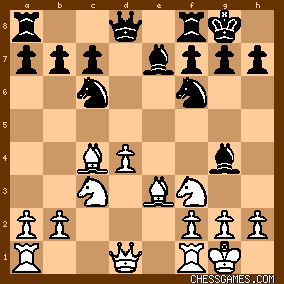
click for larger viewChances here were about equal.
10... Rb8!
"The immediate 10...BxN 11. QxB Nxd4 leaves the b7 pawn in prise." (Tournament Book) 11. d5
A bit over-eager by Marshall. 11. h3 or 11. Be2 or 11. Rc1 were perhaps simplest and best. But, in fairness to Marshall, the text is not all that bad. 11... Ne5
11...BxN and then 12...Ne5 was perhaps more accurate. 12. Be2 BxN
13. BxB

click for larger viewAnd so the perennial question about the isolated d-pawn is presented: is this a weakness or a strength for White? 13... a6
14. Bd4 Bd6
It is hard to see why Tarrasch didn't eliminate Marshall's two Bishops with 14...NxB+. 15. Be2
He won't get another chance.
15... c5
16. dxc6 e.p. Nxc6
17. Be3 Qc7
"By solid positional play Black has achieved a comfortable poisition." 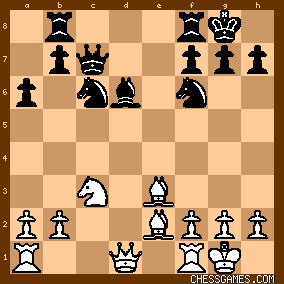
click for larger viewBoth sides had played well to this point. But beginning here, things became wild, and then time pressure as the players approached the move 30 time control led to all sorts of anomalies. |
|
Apr-04-21
 | | KEG: Post II
18. h3
18. g3 was better.
18... Qe7
"!"--(Tournament Book)
Black would be slightly better placed with 18...Bh2+ 19. Kh1 Bf4 20. BxB QxB. 19. Nd5
This exchange leaves White's Queen in a precarious location and only benefits Black. 19. Re1 or 19. Bf3. 19... NxN
20. QxN Rfd8
21. Qh5
The Queen obviously had to flee, but 21.Qg5 or 21. Qb3 were better. 21... g6
22. Qg5

click for larger view22... f6
Surprising from Tarrasch, who was usually careful not to weaken his King-side pawns. Better were 22...Qe5 or the tricky 22...Nd4. Alternatively, Tarrasch could just have sought equality with 22...QxQ. 23. Qh4
Daring Tarrasch to play to snatch the White b2 Pawn. 23... Qe5
Challenge accepted.
24. g3 Qxb2
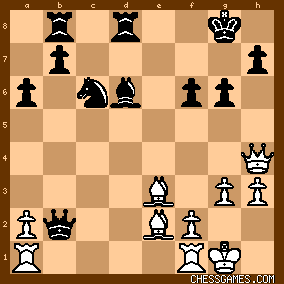
click for larger viewI suspect that both sides were happy here. Marshall had two Bishops and a bit of initiative. Tarrasch had a pawn in hand. This sort of unbalanced position usually favors the stronger player. 25. Bc4+ Kh8
26. Rab1 Qe5
27. Rfe1 Qf5

click for larger viewNow, the excitement began. In what follows, I have greatly benefited from the superb commentary on this site by <Pawn and Two>, which has identified the key points. Indeed, the commentary by <Pawn and Two> is so excellent that I might not have commented on this game at all had I not decided to analyze the entire Monte Carlo 1902 tournament. 28. Bd3?
"?"--(<Pawn and Two>). As <Pawn and Two> has explained, Marshall should have played 28. g4 while the text gave Tarrasch the chance to seize a major edge with 28...Bxg3! After 28. Bd3?, the position was:

click for larger view28.... g5?
"!"--(Tournament Book)
Tarrasch must have been rusty. Both he and the Tournament Book missed what <Pawn and Two> has pointed out: Black is better with 28...Bxg3! 29. Qxh7+ KxQ 30. BxQ Bxf2+ (or, if he plays for the initiative rather than just counting pawns, 30...gxB 31. KxB b5--KEG) 31. KxB gxB After the weak text, Marshall could have seized the advantage: 
click for larger view29. Qc4?
"?"--(<Pawn and Two> As <Pawn and Two> has pointed out, Marshall should have played 29. BxQ gxQ 30. Bb6 Rg8 31. g4. 29... Qxh3

click for larger viewQuite an exciting position! But the move 30 time control had yet to be reached, but both sides may have been in time trouble since they both erred on their respective 30th turns. |
|
Apr-04-21
 | | KEG: Post III
30. Qe4?
"?"--(<Pawn and Two>) Marshall would have had all sorts of exciting counter-chances with 30. Bxg5 (e.g. 30...Rf8 [obviously not 30...fxB 31. Qc3+ and wins--KEG] 31. Bh4 [better than 31. Qe6 as suggested by <Pawn and Two>]). After 30. Qe4, Tarrasch had a chance to seize the edge, the position now being: 
click for larger view30... Re8?
Tarrasch would have been better with 30...Be5; much better than 30...Ne5 as suggested by <Pawn and Two>; e.g., 31. Bf1 Qh5 32. Be2 g4 (better is 32... Qg6, but even then Black has only a tiny advantage) 33. Rxb7 and White, if anything, is better. 31. Qf3 Qh6
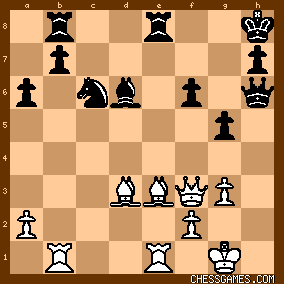
click for larger viewMarshall was two pawns down, but his two Bishops and pressure gave him decent counter-chances. But starting here, Marshall appeared unable to press his initiative, and got into deeper and deeper trouble: 32. Kg2?
"?"--[<Pawn and Two>] <Pawn and Two> here recomments 32. Be4. Even better for White is 32. Bf5. After 32. Kg2?, Tarrasch went to work to exploit his material advantage. 32... Ne5
"!"--(Tournament Book)
33. Qd5
<bkpov> here recommends 33. Rh1, but that loses quickly to 33...QxR+ 34. RxQ NxQ 35. Rxh7+ Kg8 36. KxN Re7 and Black--with the exchange plus two extra pawns--must win. 33... NxB
34. QxN Be5

click for larger view35. Rh1
Marshall was still down two pawns with dwindling compensation. 35. Bd4 or 35. Qd7 or 35. Rbd1 were perhaps slightly better. 35... Qg7
36. Rbd1
Marshall's best (and perhaps only) chance was probably 36. Rxh7+, but after 36...QxR 37. Rh1 QxR+ 38. KxQ Black, with two Rooks and pawn for the Queen, has good winning chances. 36... Re7
37. Bc5 Rc7
38. Qf5!
White's only way to stay in the game.
38... Kg8
39. Bb6 Re7
39...Rf7 is much stronger. After the text (39...Re7), the position was: 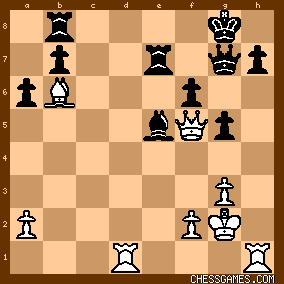
click for larger viewThough two pawns down, Marshall had at least decent practical chances. But beginning with his next move, he squandered even these opportunities and was soon seemingly hopelessly lost. |
|
Apr-04-21
 | | KEG: Post IV
40. Bd8?
This gave Tarrasch a chance to regroup favorably and reach-with his extra two pawns--a likely winning position. Best was 40. Bc5. 40... Rf7
41. Rhe1
Perhaps 41. Rd5 or 41. Rd2 were slightly better. 41... Qf8
42. Bb6
42. Rd5 is tricky, but ultimately insufficient to allow Marshall to save the game against best play: e.g., 42. Rd5 RxB 43. RexB RxR 44. RxR Kg7 and Black should win easily with his extra two pawns. 42... Qe8
43. Be3
As <Pawn and Two> correctly notes, 43. Bd4 eventually reduces to another two pawn ahead Queen and Rook "ending" that Black should win. 43... Qc6+
44. Kg1 Re8

click for larger viewThe diagnosis of this situation by <Pawn and Two> seems entirely correct. White is by this point "totally lost." So he tried something "unexpected": 45. Bxg5?!
The "better" 45. Bc1 or 45. Rc1 held out few if any prospects to save the game. So the text was worth a try. Prior to this move, Tarrasch likely did not perceive any risk of losing. Perhaps the text took him completely aback. 45... fxB
46. Qxg5+

click for larger viewTarrasch was now up a piece, and the game was over for Marshall. But... 46... Bg7??
"??"--(Tournament Book)
"???"--(<Pawn and Two>) "After 46...Rg7 White is lost." (Tournament Book) <Pawn and Two> aptly characterizes 46...Bg7?? as "one of the worst moves of [Tarasch's] career" and points out that it transformed "...a totally won position into a totally lost position in one move." 47. RxR+
Of course!
47... QxR
48. Rd8
Ouch!

click for larger view48... QxR
49. QxQ+ Bf8
49...Rf8 was probably a slight improvement with little chance to alter the outcome. After 49...Bf8, the position was:

click for larger viewThis is a clear win for White. But still requires work, and Tarrasch may have hoped that the young Marshall, coming off an awful 1901, would falter. But, as will be seen, from here Marshall played with care, aggression, and precision, and won without giving Tarrasch the slightest chance to save himself. |
|
Apr-04-21
 | | KEG: Post V
Winning this sort of ending can be a bit of a chore, but Marshall made it look easy. 50. Qd5 Bg7
In effect, Tarrasch was saying: Come and get me, I'm just going to sit pat. As will be seen, Marshall was pleased to accommodate Tarrasch. 51. f4
Marshall's plan was simple, eliminate the Black h-pawn and immobilize the Black Queen-side. Then Tarrasch would have to let him blow up the attempted blockade. 51... Bh6
52. Kg2 Bf8
53. g4!

click for larger viewThe plan continues!
53... h6
54. Kh3
The White King must play a leading role in the assault. 54... Kg7
55. g5
55. Kh4 would also have been good.
55... hxg5
56. fxg5

click for larger viewPart one of Marshall's plan had been accomplished. The Black h-pawn was gone. Now he would advance the g-pawn after which he would turn his attention to immobilizing the Black Queen-side. 56... Kg6
57. Qe6+ Kg7
58. Kg4 Re7
59. Qf6+ Kg8
60. g6 Re4+
61. Kf5 Re7
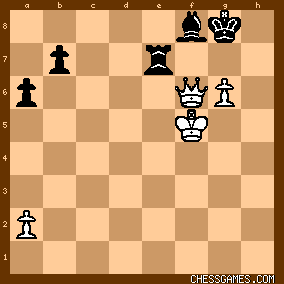
click for larger viewNow it was time to deal with the Black Queen-side pawns. 62. a4 Rg7
63. a5 Re7
64. Qd4 Rg7
65. Qd5+ Kh8
Tarrasch was now nearly out of moves:

click for larger view66. Qd8 Kg8
67. Kf6

click for larger view1-0
If now 67...Re7 (Black's only move) then Marshall wins with [to quote the commentary in the Tournament Book] "68. QxR! BxQ+ 69. KxB [and now] the White a-pawn wins the game." A nice wrap-up by Marshall after a sloppy game. |
|
|
|
|





